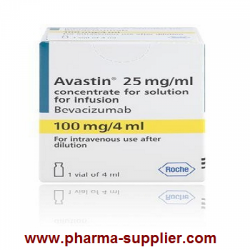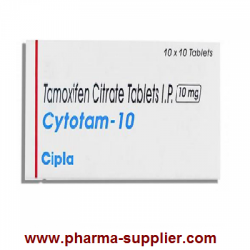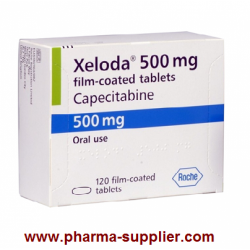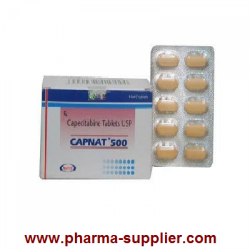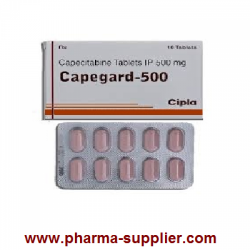Colon cancer
What is Capnat (Capecitabine 500mg Tablets)?
Capecitabine is a cancer medication that interferes with the growth of cancer cells and slows their spread in the body. Capecitabine is used to treat breast cancer and colon or rectum cancer that has spread to other parts of the body. Capecitabine may also be used for other purposes not listed in this medication guide.
How does this drug work?
Capecitabine belongs to a group of chemotherapy drugs known as anti-metabolites. It keeps cells from making DNA and RNA, which stops cancer cells from growing. Capecitabine is converted to the drug 5-fluorouracil (5-FU) in your body, letting more of the active drug get to the tumor.
Side Effects
You will probably not have most of the following side effects, but if you have any talk to your doctor or nurse. They can help you understand the side effects and cope with them.
Common
- diarrhea
- nausea
- vomiting
- sores in mouth or on lips
- tiredness or weakness
- numbness, tingling, itching of hands or/and feet
- skin redness, rash, dryness
- low red blood cell count (anemia) with increased risk of tiredness (fatigue)
- skin irritation
Less common
- low white blood cell count with increased risk of infection
- low platelet count with increased risk of bleeding
- pain in the belly, back, or joints
- constipation
- poor appetite
- heartburn after eating
- fever
- feelings of pins and needles in hands and/or feet
- headache
- dizziness
- trouble sleeping
- cough or trouble breathing
- eye irritation
- skin color changes
- hair loss or thinning (including face and body hair)
- bleeding from the bowel
abnormal blood tests which suggest that the drug is affecting the liver (Your doctor will discuss the importance of this finding, if any.)
Rare
- severe diarrhea with dehydration
- depression
- bowel damage (necrotizing typhlitis)
- heart damage with swelling of ankles, chest pain, abnormal heartbeat
- peeling and blistering of palms and soles of feet
- allergic reaction
- death due to bleeding, heart failure, heart attack, infection, or other causes
There are other side effects not listed above that can also occur in some patients. Tell your doctor or nurse if you develop these or any other problems.
Capegard (Capecitabine 500mg Tablets)
Capegard (Capecitabine) is a cancer drug which is indicated for colorectal cancer and metastatic breast cancer. Its mechanism of action involves working within the cancer cells to affect their growth. This chemotherapy drug is used for adjuvant treatment for patients affected by Dukes` C colon cancer and as a first line therapy for metastatic colorectal cancer. When used for breast cancer, it may either be used together with other medicines (such as docetaxel) or on its own.
This medicine is classified as an antimetabolite, and it is a prodrug. This means that it is converted into 5-fluorouracil (5-FU) by enzymes in the body. Following this, healthy and tumor cells further convert it into other metabolites (FdUMP and FUTP) that interfere with the process in which DNA, RNA and protein are synthesized. Without DNA, the division and growth of cancerous cells is affected and they are unable to grow properly. This results in their eventual death, allowing for the size of the tumor to be reduced and the growth of the cancer cells stopped.
In addition to attacking cancer cells, this medicine may also affect healthy cells. This could result to side effects. However, due to the fact that the conversion of the prodrug into its active form (5-HU) usually only occurs in the cancerous cells, the risk of side effects is less when compared to other cancer medicines. A significant amount of medical research has been conducted which focused on this medicine`s effects if used for other conditions. These studies examined its effects if used for gastric, pancreatic or esophageal cancer.
How is Capegard (Capecitabine 500mg Tablets) used?
Capegard-500 is usually taken twice daily, in the morning and evening or as directed by a doctor. The tablets should be taken within 30 minutes of a meal along with a full glass of water. The usual cycle of using the drug is every day for 2 weeks, then stopped for 1 week. The tablets should be swallowed whole and not split, chewed or crushed. Contact a doctor for the amount of times needed to repeat the cycle as it will depend on the patient's condition and their response to the therapy.
Side effects
Treatment with the chemotherapy agent Capegard (Capecitabine) can cause side effects. Ensure that you report all reactions to your physician. Possible reactions include:
- Pruritis
- Hair loss
- Low appetite
- Irritated eyes
- Altered taste sensation
Certain adverse events are serious and you will need immediate treatment if they occur. Consult your physician straight away if you suffer from diarrhea, nausea, inflammation of the feet and hands, pain and sores on the mouth, symptoms of an infection or any other severe reactions that have not been referenced in this paragraph.
Dosage
Capegard (Capecitabine) 500mg tablets are taken by mouth. The dosage needed will be decided upon by the physician in charge of medical care and the patient will need close medical supervision throughout the entire duration of treatment. These tablets need to be swallowed whole alongside a full glass of water within 30 minutes of consuming a meal.
If used for monotherapy, it is possible that treatment will consist of twice daily dosing for a period of 2 weeks, after which a 1 week break will be advised. This 3 week cycle may need to be repeated as necessary in accordance with the instructions of your physician. Patients with renal impairment may need a lower dosage, and it is also important to note that the exact dosage needed may be individualized by the physician based on other factors.
- 1
